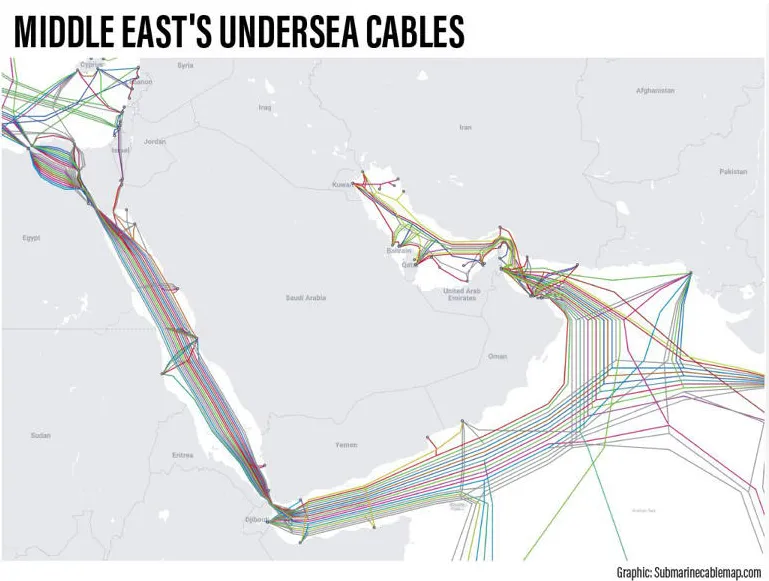Red Sea outage raises decentralization questions
'Submarine cables create single points of failure,' says analyst, pointing to satellites and mesh routing as alternatives

A ship’s anchor dragging along the Red Sea seafloor cut through cables – and exposed the world’s dependence on fragile data routes. Experts say this blackout isn’t just a regional problem, but a wake-up call for decentralization.
The cuts near Jeddah slowed internet speeds across India, Pakistan, the UAE, and other countries in Asia, Africa, and the Middle East, disrupting millions of users.
To Cassandra Heart, founder of Quilibrium, the Red Sea outage exposed the flaw of centralization: rigid, inflexible networks.
“An architecture built on dedicated, pre-planned routes creates rigid dependencies that limit network flexibility,” Heart told The Crypto Radio.
She pointed out that while content delivery networks can reduce transit times, they don’t solve the underlying problem of centralization.
Eneko Knorr, CEO and co-founder of Stabolut, stressed a similar concern: “Submarine cables’ concentrated routes and shared landing stations create network vulnerabilities susceptible to disruption from natural disasters, sabotage, or geopolitical tensions.”
By contrast, he said, “decentralized space-based nodes distribute connectivity across multiple pathways, reducing network vulnerabilities and enhancing global resilience.”

A map of the Middle East’s undersea cables shows how concentrated routes create single points of failure when disruptions occur. Photo: Submarinecablemap.com
Building a tougher internet
One proposed fix is mesh-based routing, which distributes traffic through many small nodes instead of central hubs. “Mesh-based routing offers underserved areas faster access to code, files, and data,” Heart said.
In practice, this means devices can retrieve information from the nearest available node, avoiding long, fragile routes.
When it comes to using decentralized services to provide that retrieval, “a capitalist market enables more efficient traffic routing, exposing the adaptability limitations of centralized corporate designs,” she added.
Considering the red sea cable cut incident, “regions with fragile infrastructure suffer most during cable outages, leaving populations isolated,” Knorr said.
“Here, decentralized systems bypass terrestrial bottlenecks, extending digital access to underserved communities and promoting digital inclusion,” he added.
"There's long range radio and Bluetooth-based mesh distribution for content, and these two things, especially long-range radio, can work really well in lower income areas that don't have access to high bandwidth or potentially any bandwidth and gives them a bigger option. There's also, of course, satellite internet,” Heart said.
Elon Musk’s Starlink satellite internet service is expanding globally, with Lebanon granting a licence this week. The move highlights how satellite links can bypass fragile ground infrastructure in regions prone to outages.
Starlink is connecting more than 7M people with reliable high-speed internet across ~150 countries, territories and many other markets.
— Starlink (@Starlink) August 28, 2025
Thank you to all our customers around the world! 🛰️🌎❤️ → https://t.co/1EQX9tmlmQ pic.twitter.com/zmxbFau970
Heart also explained how decentralized services “function regardless of obstacles, routing through any available connection.” She shed light on how decentralized infrastructure is crucial for maintaining critical health systems during network disruptions.
“Communication platforms like WhatsApp or Telegram can be life-or-death critical, especially during connection severance or national platform blocks,” Heart stressed.
In Nepal, when the government recently placed a temporary ban on WhatsApp, Facebook, and YouTube, downloads of the decentralized Bluetooth mesh app bitchat surged to nearly 49,000 in a day, showing how citizens can switch to alternative networks when centralized services are cut off.
there when you need it https://t.co/gbTxEPgEjP
— jack (@jack) September 10, 2025
The trade-offs of decentralization
While the benefits of decentralization are clear, experts warn it comes with its own risks.
Knorr noted that decentralized space-based connectivity “offers route diversity, digital inclusion, and enhanced privacy through peer-to-peer exchanges, [yet] challenges remain, such as governance, system integration, user adaptation, and maintaining robust privacy safeguards.”.
“Anonymity relies on ‘hiding in numbers,’ and reducing user base diminishes individual privacy and safety,” Heart added. “Designing resilient systems requires navigating performance trade-offs, where the value of privacy can justify potential computational or latency costs.”
If designed and deployed thoughtfully, “these systems could help deliver affordable, reliable connectivity where it is most needed, bridging divides and opening new opportunities for access to digital services,” Knorr agreed.
“While adoption may involve a learning curve, growing digital literacy and the development of more intuitive platforms are likely to smooth the path forward.”
What it takes to win users
Heart thinks that the key to mass adoption is “meeting users halfway by using skeuomorphism – creating familiar-looking products with sophisticated underlying technology to ease adoption and understanding.
“User experience challenges stem from developers who understand technology but not user needs,” Heart said.
She explained how distributed nodes may not replace but are instead an “inevitable response to increasing data abuse, offering the only path to restoring user trust through privacy-centric technologies that make data protection their core function.”
Knorr also believes that decentralized space-based systems “will complement submarine cables, creating a hybrid network that combines cable infrastructure's capacity with space networks' agility and inclusivity.”




